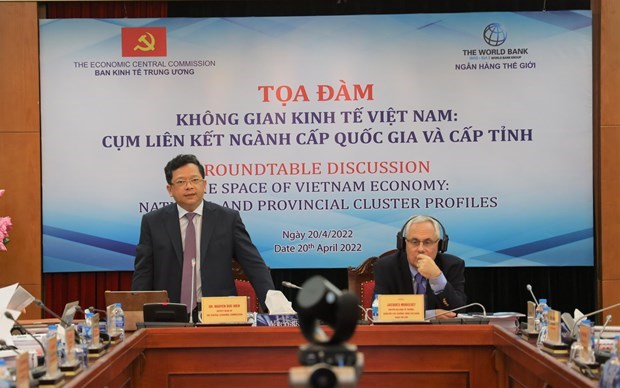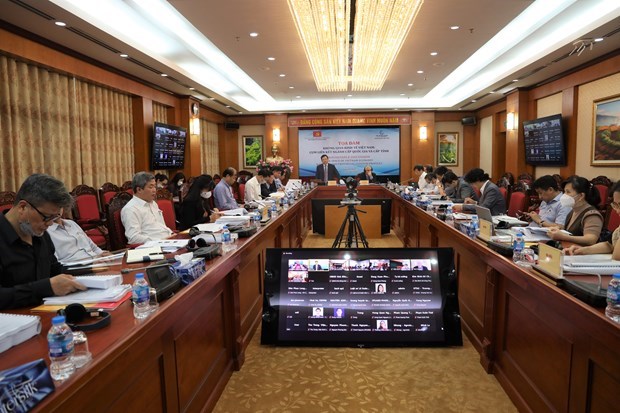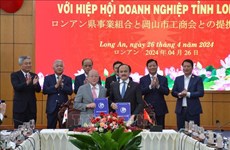Industrial clusters and value chains important to promote economic competitiveness
 Vietnam has policies and guidelines to develop economic clusters. (Photo: Vietnamplus)
Vietnam has policies and guidelines to develop economic clusters. (Photo: Vietnamplus)Developing economic space by forming industrial clusters is a popular trend in many countries around the world. The idea is to improve competitiveness and increase participation in the regional and global production network.
The Central Economic Commission in collaboration with the World Bank (WB) organized a roundtable discussion on “Space of Vietnam Economy: National and Provincial Clusters Profiles” in Hanoi on April 20.
At the event, Nguyen Duc Hien, Deputy Head of the Central Economic Commission pointed out that in recent years, Vietnam has built policies to develop economic space, especially industrial clusters, into guidelines and policies, major orientations of the Party and Government.
Specifically, Resolution 23-NQ/TW dated March 22, 2018 of the Politburo on orientations to develop national industrial development policies to 2030; vision to 2045 emphasized the formation of industrial clusters as the main focus, but also included industrial parks, production networks, industrial value chains.
In addition, the Government issued Decision No. 32/QD-TTg dated January 13, 2015 approving the Synchronous Program to develop, upgrade clusters and value chains for production. The idea is to gain competitive advantages in the electronics and information technology; textile; food processing, agricultural machinery; tourism and related service sectors.
However, Hien said that the current cluster models in Vietnam only promote geographical concentration, while economic links and participation in the production network value chain have yet to be fully developed.
 Roundtable discussion on "Vietnam's Economic Space: National and Provincial Clusters Profiles," opens in Hanoi on April 20. (Photo: Vietnamplus)
Roundtable discussion on "Vietnam's Economic Space: National and Provincial Clusters Profiles," opens in Hanoi on April 20. (Photo: Vietnamplus)The Central Economic Commission has coordinated with the World Bank in Vietnam to carry out a number of studies to serve the development of the Project on "Industrialization and modernization guidelines and policies to 2030, with a vision to 2045" and developed a number of related research reports, including the report on "Vietnam's Economic Space: National and Provincial Clusters Profiles".
The World Bank's Representative in Vietnam, Chief Economist, Program Director of WB programs Jacques Morisset shared that the bank's research will help Vietnam identify and evaluate the level of sectorial linkage at the national and provincial levels as a basis for economic policy making. This should help businesses in orienting their operations and investments in Vietnam.
At the workshop, Pham Minh Duc, Senior Economist, Research Team Leader of the World Bank in Vietnam and Richard Bryden, Founding Director of the US Cluster Mapping Project, Harvard University, a member of the World Bank research team presented a report on "Issues in Vietnam's Economic Space: Clusters at National and Provincial Levels."
He presented methodology and research methods for building industrial cluster reports and the specialization among regions, thereby fully assessing the country's industry linkages, clarifying profile of clusters at national and provincial levels.
Deputy Head of Central Economic Commission Nguyen Duc Hien said the report has high scientific and practical significance. He stated it is valuable for reference to assist the central and local governments to clearly identify advantages in the development of industrial clusters./.
According to Hien, the report is also an important document to actively serve the Steering Committee and Editorial Team to develop the Project on "Industrialization and modernization guidelines and policies to 2030, with a vision to 2045” and is a useful reference for ministries, branches, central and local agencies in orienting the development of socio-economic development policies in the coming time./.













